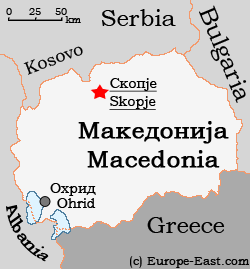Official name
Република Македонија (Republika Makedonija) Republic of Macedonia. But this is only the 'unofficial' name. The official name used by the UN or at the Olympic Games etc is F.Y.R.O.M. - this stands for Former Yugoslavian Republic of Makedonija. The reason for this ridiculous name is a quarrel with the southern neighbour, Greece. One of the Greek provinces is called Macedonia as well. Hence, the Greek government is afraid of a pro-Macedonian, secessionest movement. Greece even threatened with an extensive boycott (actually it was more than a threat) if Macedonia...ooops, I mean FYROM...would dare insist on its proper name. Therefore Macedonia had to look for an alternative. Of course, Macedonians only use the name Macedonia.
Area & Population

| ||
| Clickable Map of Macedonia |
Macedonia is only 25,713 km² large (that's little more than Wales or Vermont)
The population is less than 2.1 million* (2003)
The population of Macedonia is quite mixed - ⅔ are Macedonians, 23% Albanians, 4% Turks, 2.2% Roma, 2.1% Roma and others As of 1994 and definitely subject to change.*
Religion
Corresponding to the ethnic groups: 67% are Macedonian-Orthodox, 30% are Muslims, others 3%.*
Time zone
GMT +01 hr (Central Europe Time), with daylight-saving time (+1 hour) in summer.
*Source: CIA World Factbook
Macedonian. The language belongs to the South Slavic branch of the Slavic language group. For a long time, it was just considered to be a Bulgarian dialect. Now, linguists accepted the fact that it's a genuine language with two main dialects - Eastern and Western Macedonian. Macedonian uses the Azbuka aka Cyrillian script, but there are differences to other Slavic languages. Altogether, 31 letters are in use, among them some letters that aren't in use any longer in Russian or Bulgarian. These letters include (small letters in brackets) the following:
- Ѓ ???ѓ) is pronounced as a soft [ g ], non-existent in English but similar to the [ gu ] (phon: gj) in 'Guantanamo'.
- S (s) Unusual in Slavic scripts. Pronounced as the [ ds ] (phon: dz) in [ needs ]. Rarely used.
- J (j) Also not very commmon in Slavic alphabets. Pronounced as the [ y ] (phon: j) in [ yes ].
- Љ (љ) A mixture of 'L' and the 'soft sign', pronounced as the [ li ] (phon: lj) in [ million ]
- Њ (њ) A mixture of 'N' and the 'soft sign', spoken as the [ ny/ñ ] (phon: nj) in [ cañon/canyon ].
- Ќ (ќ); Mixture of 'K' and the 'soft sign', pronounced as the [ ky ] (phon: kj) in [ Tokyo ].
- Џ (џ) Pronounced as the [ dg ] (phon: dʒ) in [ hedge ].
Because of these special characters, many letters usually used in Cyrillic scripts, such as [ я = ya ], [ ю = yu ], [ щ = shch ] as well as [ ь and ъ = hard and soft sign] are not in use. A basic knowledge of Russian or even Bulgarian is definitely helpful. To give an example, 'thank you' in Bulgarian is [ благодаря = blagodarya ], in Macedonian it's [благодарам = blagodaram]. Okay, the Russian word [ Спасибо = spasibo] is completely different, but the Russian word [ благодарить = blagodarit' ] means 'to thank s.o.'. Mainly young people often speak some English as well. Note that a large minority is of Albanian nationality, and naturally they prefer talking in Albanian, which has absolutely nothing to do with Slavic languages.
For a table with the most important words in Macedonian and other Slavic languages please →click here.
©2024 Europe-East.com

 Albania
Albania Macedonia
Macedonia